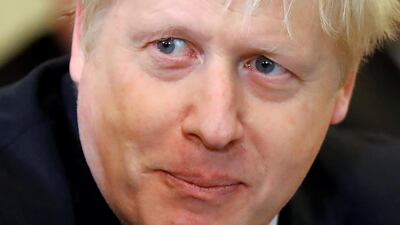UK Prime Minister Boris Johnson’s bid for re-election was rocked by a Cabinet resignation on Wednesday as he launched his campaign with a rallying cry to complete the Brexit mission.
Mr Johnson stood outside his Downing Street residence to deliver his Conservative Party’s pro-business, pro-Brexit message just an hour after his most senior colleague in Wales quit.
Welsh Secretary Alun Cairns quit after claims that he lied about what he knew of an aide’s role in the sabotage of a rape trial.
The resignation was an unwelcome distraction for Mr Johnson who began his day of campaigning with a ferocious attack on the economic plans of his main rival Jeremy Corbyn, which he compared to Stalin’s attack on Russian farm owners in the 1930s.
"They pretend that their hatred is directed only at certain billionaires and they point their fingers at individuals with a relish and vindictiveness not seen since Stalin persecuted the kulaks," he wrote in an article for the Daily Telegraph.
The kulaks were the millions of lower middle-class whose property rights were abolished by the Soviets.
The election was called for December 12 after Mr Johnson failed to force his Brexit deal through a bitterly divided Parliament. He had pledged to take the UK out of the EU on October 31.
Mr Johnson on Wednesday claimed that Parliament had been stuck in a rut for three and a half years after the UK voted in a referendum to leave the world’s largest trading bloc.
“I have got to the stage where I want to chew my own tie in frustration,” he said.
Mr Johnson said a government led by Mr Corbyn would be a “horror show”, marked by months of continued uncertainty over Brexit.
The prime minister staked his credibility on a “do or die” Brexit by October 31 but still goes into the campaign with a healthy lead in the polls.
Mr Corbyn said he was confident he could secure in extension from the EU to enable a new deal to be negotiated.
He told Sky News he had spoken with "many officials in the EU and heads of government elsewhere".
Polls suggest that Brexit is the most important topic for voters, with the future of the state-run National Health Service also prominent.
But Labour party strategists are concerned that its voters could switch to the hard-line Brexit Party, led by populist Nigel Farage, which is contesting nearly all of the 650 seats in Parliament.
Some of Mr Johnson’s opponents, who oppose his Brexit strategy, have made pacts to try to defeat his Conservative Party.
On Wednesday he sought to portray the Conservatives as the party of law and order, education and promoter of investment.
But the resignation of Mr Cairns was only one of a series of gaffes in the 24 hours before Mr Johnson went to see Queen Elizabeth II to start the five-week campaign.
Jacob Rees-Mogg, a prominent pro-Brexit MP and leader of the House of Commons, has been criticised for suggesting that residents of Grenfell Tower, the high-rise block that burned down in June 2017 killing 72 people, should have used their common sense and ignored fire officials’ instructions to stay in the building.
After a backlash from opponents and families of the victims, Mr Rees-Mogg apologised but faced continued calls for his resignation.
"Jacob recognises what he said was wrong and caused a huge amount of hurt and distress and has apologised unreservedly," the Conservative Party chairman, James Cleverly, told the BBC on Wednesday.
The ruling party faced further criticism after doctoring a video it posted online, which made it falsely appear that a senior opposition could not answer a question about Brexit.
The social media advertisement has been called a misrepresentation.
Mr Cleverly denied his party had presented “fake news” and said the focus of the election in coming weeks would be on the party’s different approaches to Brexit.
Meanwhile, Mr Cairns faced continued questions over whether he would still stand as an MP at the election.
“This is a very sensitive matter and in the light of continued speculation, I write to tender my resignation as Secretary of State,” Mr Cairns said in his letter to the premier.
The resignation was regarded as an attempt to clear the decks of distractions before the campaign began in earnest.
Mr Corbyn spoke at his own campaign event in his home town of Telford on Wednesday when he pledged to be a “very different kind of prime minister” from Mr Johnson.
“In this election, Labour is putting forward the most radical and far-reaching plan for real change in our lifetimes,” he said.
"But I know we've got to work very hard to win people's trust because, for all the excitement here, many people in our country have grown weary of politics.
"They've lost faith that politics can change anything that actually affects their lives."
